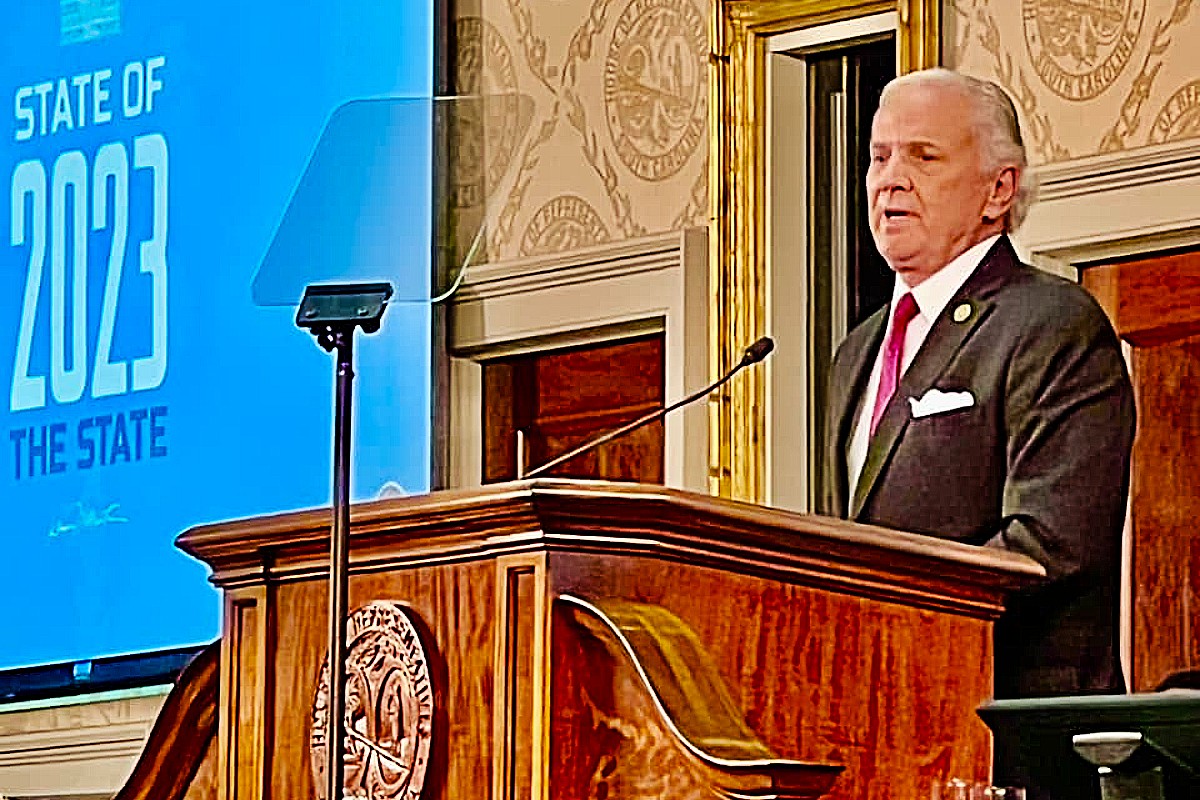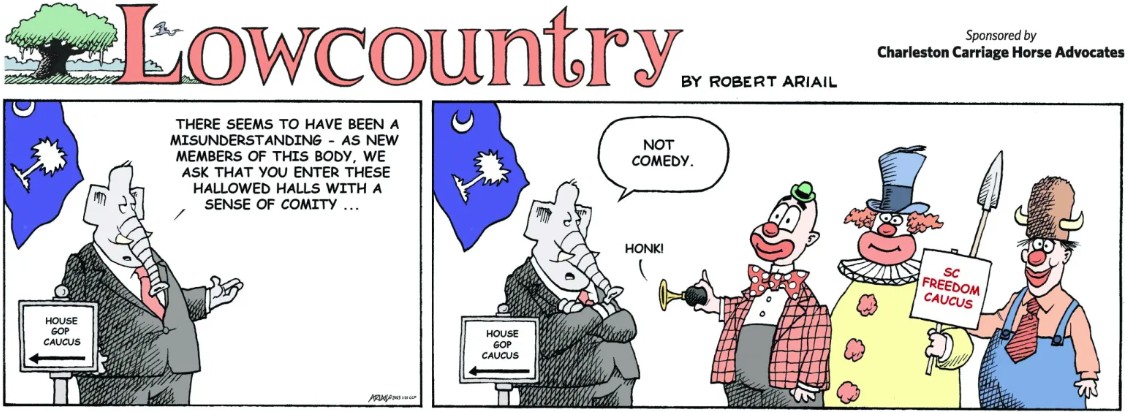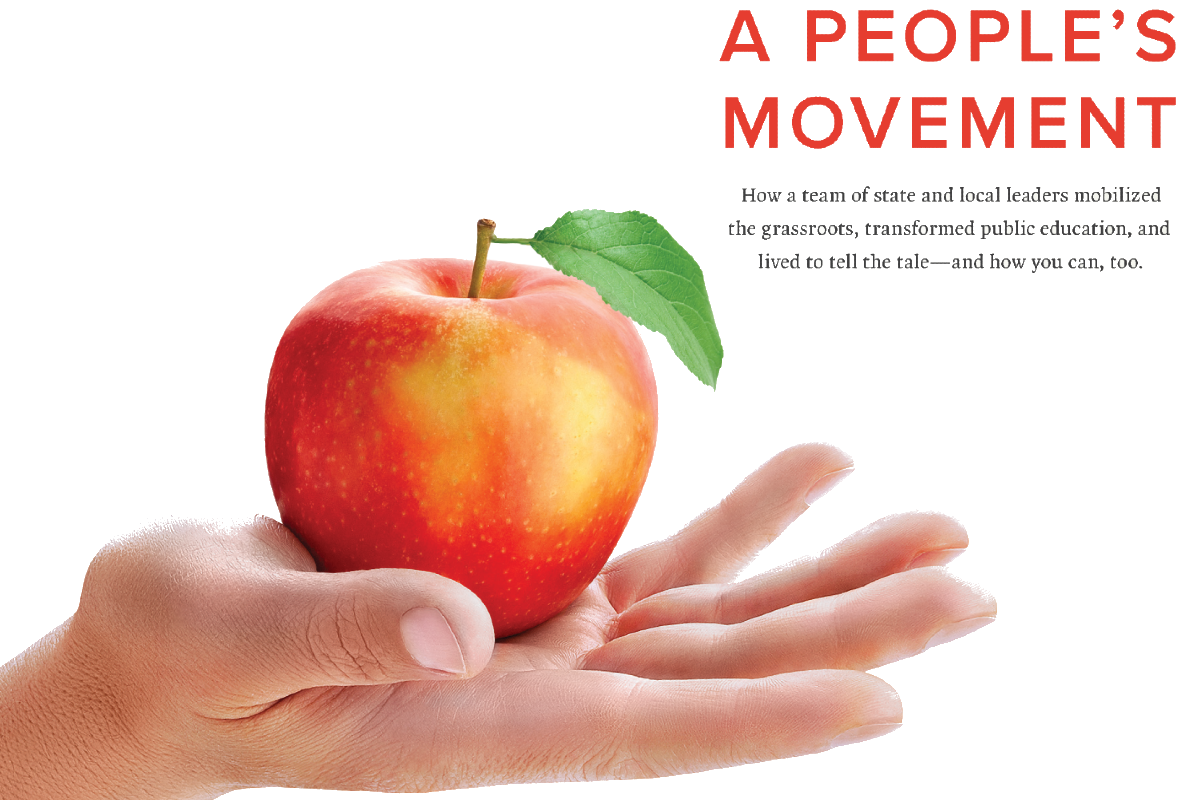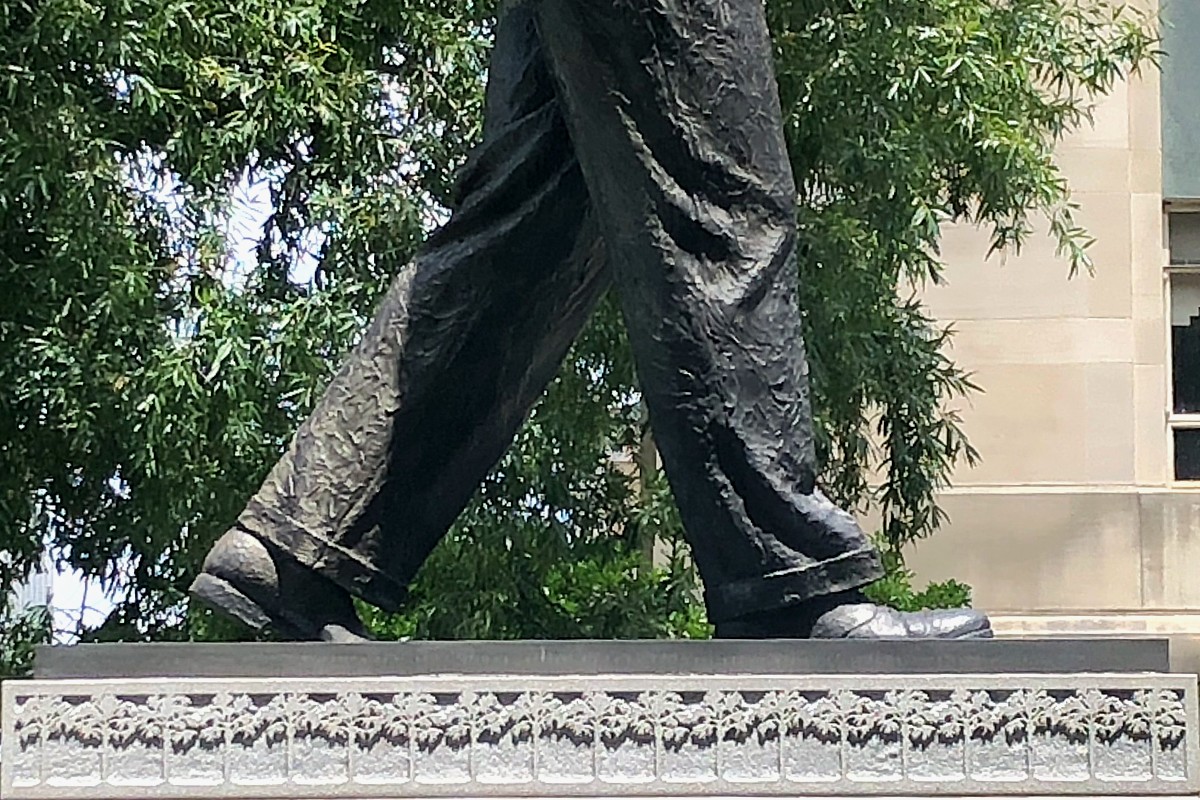STATEHOUSE REPORT | ISSUE 22.04 | JAN. 27, 2023
NEWS: Abortion ban, prosperity, hate crimes are at top of 2023 agenda
NEWS BRIEFS: Court demands more info in challenge to S.C. executions
LOWCOUNTRY, Ariail: GOP comity
COMMENTARY, Brack: New playbook offers strategies for legislative success
SPOTLIGHT: AT&T
FEEDBACK: Send us your thoughts
MYSTERY PHOTO: Shoes in bronze
Abortion ban, prosperity at top of 2023 agenda

Staff reports | The day after Gov. Henry McMaster pushed legislators to approve another abortion ban, House members took the first steps to do just that.
On Thursday, a House subcommittee approved a proposal for a total abortion ban with some exceptions during a public hearing. Earlier this month, the S.C. Supreme Court struck down a six-week abortion ban passed in 2021 that went into effect after the U.S. Supreme Court in June overrode abortion protections from the landmark Roe v. Wade decision. The South Carolina high court overturned the state ban on grounds that it violated the state constitution’s explicit right to privacy.
The new House bill was proposed to ban abortion at conception with exceptions for rape, incest, fatal fetal anomaly and the mother’s life and health. The bill must pass the House Judiciary Committee before it can reach the House floor for a vote. Last year, the state Senate couldn’t muster the votes for a total ban, even with some exceptions.
A November 2022 Winthrop Poll showed more than 80% of South Carolina respondents believed abortion should be legal for women if the pregnancy threatens her life or health or is the result of rape. Just under half said women should be able to get an abortion for any reason.
On Wednesday night during his sixth State of the State address, McMaster also vowed to continue fighting for an abortion ban in South Carolina.
The governor also unveiled a new proposal to restructure how the state selects its judges, according to WCSC-TV. Some view it as a way to reshape the court after it overturned the six-week bank.
“When I signed the Heartbeat Act into law, I was confident that it was constitutional,” McMaster said in the address. “I still am. Therefore, I will be filing a petition for rehearing next week, along with other state officials, and I remain optimistic that we will prevail in our historic fight to protect and defend the right to, and the sanctity of, life.”
Meanwhile Wednesday in the State of the State address, the governor said he wanted the state to continue its ongoing economic prosperity in South Carolina. He urged lawmakers to keep investing record surpluses into state reserves to prepare for a recession. He also continued his backing of raising teacher wages and fixing roads and bridges.
In the Democratic response, Sen. Ronnie Sabb urged passage of a hate crimes bill: “Governor, we invite you to add your voice to ours and be a part of good government — one that discourages evil. Governor McMaster, let’s pass Hate Crime Legislation.”
- Have a comment? Send to: feedback@statehousereport.com
Court demands more info in execution challenge

Staff reports | The S.C. Supreme Court ordered a lower court to collect more information from the state Department of Corrections regarding the state agency’s attempts to get drugs for lethal injections.
“Inmates’ discovery requests regarding lethal injection are particularly relevant and reasonable in light of the fact that, for over 10 years, other states have continued to perform executions using lethal injection, rather than electrocution and the firing squad,” Chief Justice Donald Beatty wrote.
The order means it could take four more months before justices decided on the legality of the electric chair and firing squad as means of execution.
In other news this week:
![]() Murdaugh trial kicks off to national audience. After three days of work to empanel a jury of 12 people and six alternates, the high-profile double murder trial of disbarred Hampton County lawyer and scion Alex Murdaugh got underway with witnesses. On Thursday, the officer who was first to arrive on the scene of the 2021 murder of Alex Murdaugh’s wife and son testified that Murdaugh was upset but did not see any visible tears on his face. In court on Thursday, Murdaugh cried.
Murdaugh trial kicks off to national audience. After three days of work to empanel a jury of 12 people and six alternates, the high-profile double murder trial of disbarred Hampton County lawyer and scion Alex Murdaugh got underway with witnesses. On Thursday, the officer who was first to arrive on the scene of the 2021 murder of Alex Murdaugh’s wife and son testified that Murdaugh was upset but did not see any visible tears on his face. In court on Thursday, Murdaugh cried.
S.C. fails tobacco prevention analysis. South Carolina failed its assessment of tobacco prevention among youth, according to a national advocacy group. The American Lung Association gave an “F’ to most areas of the state.
Statehouse leaders seek to reform bail system. Republican leadership in the House of Representatives has named bail reform as a top priority. Some advocates say the “catch and release” option keeps repeat offenders dangerous and described the system as a “revolving door.”
S.C. lawmakers delay judicial elections by one week. The South Carolina Senate voted to delay the judicial election to replace S.C. Supreme Court Justice Kaye Hearn. Some argued the process is undemocratic, while others were upset that South Carolina would be the only state in the country with an all-male court.
S.C. House moves forward on bill about teaching race in schools. A bill that would limit certain teachings on race in public schools is moving through the S.C. House of Representatives. One Democratic lawmaker said he would file a bill against teaching about slave owners as a response.
GOP comity

Cartoonist Robert Ariail takes a poke this week at the warfare among traditional House Republicans, who want about 20 members of the House Freedom Caucus to agree to a set of rules to be able to join the House Republican Caucus. Freedom Caucus members say that would muzzle them.
Ariail often interprets things a little differently, but always has an interesting take on what’s going on. Love the cartoon? Hate it? What do you think: feedback@statehousereport.com.
New playbook offers strategies for legislative success

By Andy Brack | Every year in the legislature, people try to get state lawmakers to pass their pet initiatives. Too many fail for reasons that are as varied as the ideas – the advocates don’t have a big enough idea, a broad enough network of grassroots support or not enough friends in the General Assembly. Or those wanting legislators to create a new law or program run out of gas and don’t work day after day to get it done.
 Getting a legislature to do something new is just plain hard, often taking years that can thin resolve. But if you go in knowing what you want is hard and you don’t give up, you can be successful.
Getting a legislature to do something new is just plain hard, often taking years that can thin resolve. But if you go in knowing what you want is hard and you don’t give up, you can be successful.
But how do you do it? Now there’s a South Carolina guide in a new book produced by the Riley Institute at Furman University. A People’s Movement by W. Robert Saffold tells the story of how former Gov. Richard W. Riley and a coalition of state and local leaders pushed through a penny tax for educational improvement during his second term in the 1980s.
“In today’s world when so many challenges face us and too many of our citizens believe that they cannot make a difference, the passage of the 1984 South Carolina Education Improvement Act is a story of what can happen when strong leaders listen and engage citizenry on matters that affect us all,” said Therese K. Dozier, an Irmo teacher during the campaign who became a National Teacher of the Year.
What we like about this book is that it literally is a playbook with 25 different strategies that were used by Riley and his team to convince the General Assembly to invest more in education. The author does a good job of explaining each strategy, or “play,” and offering context for how it helped the overall effort. Here are three past examples that can be modified for use today for any issue:
Play #1: Frame the reform effort as a statewide campaign for school improvement. Translated for today, this suggests advocates need to describe and talk about whatever their idea is about in a broad way so people can understand its importance.
Play #7: Propose a dedicated revenue source that can fully fund the reform package and that is also straightforward and simple to explain to the public. In other words, figure out a way to pay for what you want – because that makes it easier for lawmakers to adopt.
Play #10: Organize statewide blue-ribbon committees to engage “grasstops” stakeholders. It’s important to get community leaders – including business leaders – invested in what you want to do to get it done.
Play #19: Lobby legislators in person. Arguably, it’s much different for a governor to put the pinch on a legislator than a grassroots activist, but developing personal relationships is key to political success.
On June 28, 1984, after a lot of work by a lot of people, Riley signed the Education Improvement Act into law.

In an afterword in the book, the former governor, now 90, explained that education was languishing in South Carolina when he took office in 1979: “We needed comprehensive change to overcome the generations of underachievement in public education, as well as the painful legacy of segregation – barely a decade past – that had severely limited opportunities for so many of our citizens …
“We needed a people’s movement, a statewide campaign for school improvement that could overcome a history of low expectations, inertia and active opposition to the fundamental, far-reaching changes that were needed. It was this statewide campaign, paired with our comprehensive legislative strategy, that led to the bill becoming law.”
In 1993, President Bill Clinton appointed Riley to be U.S. Secretary of Education, where he served until 2001. In 2008, Time magazine named him as one of the top 10 best ever cabinet members in U.S. history.
This education playbook is seriously important as a guide for how to get things done. You can buy it online for $24.99 starting Jan. 31 at furman.bncollege.com.
Andy Brack is editor and publisher of Statehouse Report and the Charleston City Paper. Have a comment? Send to: feedback@statehousereport.com.
AT&T
 The public spiritedness of our underwriters allows us to bring Statehouse Report to you at no cost. Today’s featured underwriter is AT&T Inc.
The public spiritedness of our underwriters allows us to bring Statehouse Report to you at no cost. Today’s featured underwriter is AT&T Inc.
AT&T Inc. (NYSE:T) helps millions around the globe connect with leading entertainment, mobile, high speed Internet and voice services. We’re the world’s largest provider of pay TV. We have TV customers in the U.S. and 11 Latin American countries. We offer the best global coverage of any U.S. wireless provider*. And we help businesses worldwide serve their customers better with our mobility and highly secure cloud solutions.
- Additional information about AT&T products and services is available at http://about.att.com.
- Follow our news on Twitter at @ATT, on Facebook at http://www.facebook.com/att and YouTube at http://www.youtube.com/att.
* Global coverage claim based on offering discounted voice and data roaming; LTE roaming; voice roaming; and world-capable smartphone and tablets in more countries than any other U.S. based carrier. International service required. Coverage not available in all areas. Coverage may vary per country and be limited/restricted in some countries.
Add verification info to your letters, thoughts
We’ve gotten some letters in the last few weeks – some positive, others nasty. We like to print non-defamatory comments, but unless you provide your contact information – name and hometown, plus a phone number used only by us for verification, we can’t publish your thoughts.
Have a comment? Send your letters or comments to: feedback@statehousereport.com. Make sure to provide your contact details (name, hometown and phone number for verification. Letters are limited to 150 words.
Shoes in bronze

This week, we’ll offer something a little easier. Here’s a mystery of the bottom of a statue that should be familiar to many. Send us your guess – as well as your name and hometown – to feedback@statehousereport.com.
 Last week’s phot0, “Man on a bench” wasn’t Strom Thurmond or Henry Timrod or Albert Einstein. It was Mark Twain outside of the headquarters of the Florence County Library System that’s called the Doctors Bruce and Lee Foundation Library. The statue, donated in 2007, is believed to be the work of Arizona-based artist Gary Lee Price (similar sculpture here). Thanks to Florence resident Barry Wingard for a great picture that created lots of guesses.
Last week’s phot0, “Man on a bench” wasn’t Strom Thurmond or Henry Timrod or Albert Einstein. It was Mark Twain outside of the headquarters of the Florence County Library System that’s called the Doctors Bruce and Lee Foundation Library. The statue, donated in 2007, is believed to be the work of Arizona-based artist Gary Lee Price (similar sculpture here). Thanks to Florence resident Barry Wingard for a great picture that created lots of guesses.
Huge hat-tip to the two people who correctly guessed the statue was Twain – Pam Little-McDaniel of Florence and David M. Taylor of Darlington. Sometimes, we guess, these things don’t show up in computer searches and you just have to know it from seeing it!
>> Send us a mystery picture. If you have a photo that you believe will stump readers, send it along (but make sure to tell us what it is because it may stump us too!) Send to: feedback@statehousereport.com and mark it as a photo submission. Thanks.
- ORDER NOW: Copies are in Lowcountry-area bookstores now, but if you can’t swing by, you can order a copy online today.
- Now available as an e-book!
ABOUT STATEHOUSE REPORT
Statehouse Report, founded in 2001 as a weekly legislative forecast that informs readers about what is going to happen in South Carolina politics and policy, is provided to you at no charge every Friday.
- Editor and publisher: Andy Brack, 843.670.3996
Donate today
We’re proud to offer Statehouse Report for free. For more than a dozen years, we’ve been the go-to place for insightful independent policy and political news and views in the Palmetto State. And we love it as much as you do.
But now, we can use your help. If you’ve been thinking of contributing to Statehouse Report over the years, now would be a great time to contribute as we deal with the crisis. In advance, thank you.
Buy the book
Now you can get a copy of editor and publisher Andy Brack’s We Can Do Better, South Carolina! ($14.99) as a paperback or as a Kindle book ($7.99). . The book of essays offers incisive commentaries by editor and publisher Andy Brack on the American South, the common good, vexing problems for the Palmetto State and interesting South Carolina leaders.
More
- Mailing address: Send inquiries by mail to: P.O. Box 21942, Charleston, SC 29413
- Subscriptions are free: Click to subscribe.
- We hope you’ll keep receiving the great news and information from Statehouse Report, but if you need to unsubscribe, go to the bottom of the weekly email issue and follow the instructions.
- Read our sister publication: Charleston City Paper (every Wednesday in print; Every day online)
- © 2023, Statehouse Report, a publication of City Paper Publishing, LLC. All rights reserved.
















 We Can Do Better, South Carolina!
We Can Do Better, South Carolina!